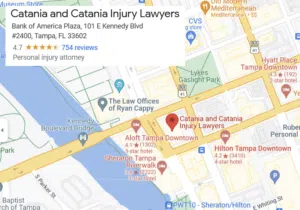
If another party injures you, you could receive compensation for your injuries and damages. The at-fault party can be held financially liable under one or more personal injury laws.
However, unlike no-fault car insurance, you may not receive the money for a personal injury claim for months or even years after the injury.
The facts of the case and other issues affect how long it takes to settle a personal injury case. For example, a case involving a catastrophic injury generally takes much longer to resolve than a case involving a broken bone that heals in six to eight weeks.
Our Tampa personal injury attorneys understand the need to settle your claim as quickly as possible. However, rushing to settle a case could result in a much lower settlement amount than your injury claim is worth.
Table of Contents
What Factors Affect the Timeline for a Personal Injury Case?
Most of the factors that impact the timeline for your case are not within our control. Factors that can increase the time it takes to settle your case include, but are not limited to:
- The severity and type of your injuries
- The length of your recovery
- The time it takes to complete an accident investigation to gather evidence
- The parties involved in the claim
- The willingness of the insurance company and other parties to settle the case
- Whether there is a dispute regarding fault for the cause of the injury
- Sustaining permanent disabilities and impairments
- The type of personal injury law applicable to the claim
- Whether we need to file a personal injury lawsuit
The good news is that most insurance claims settle without filing a personal injury lawsuit.
Settlement negotiations can go quickly when you have an attorney involved from the beginning of the case. Your lawyer gathers evidence proving fault, documents damages, and advocates for a fair settlement in a timely manner.
What Are the Typical Steps in the Timeline for a Personal Injury Case?
Each personal injury case is different. However, there are common steps that most personal injury cases follow:
Initial Appointment with a Personal Injury Attorney
During a free consultation with a Tampa personal injury lawyer, you discuss your accident and injuries. The attorney discusses legal options and the laws that apply in your case.
You will also discuss attorneys’ fees, contingency fees, and costs of the case. The attorney answers your questions and explains what happens next if you decide to hire the attorney to handle your personal injury case.
Accident or Injury Investigation
The attorney investigates the cause of your injury. An attorney takes numerous steps to gather evidence and identify all parties who contributed to the cause of your injury. The attorney also identifies insurance coverage that applies in your case.
Steps that an attorney might take to investigate an injury claim include:
- Obtain copies of accident and police reports
- Gather physical evidence from the accident scene
- Search for videos and photographs of the accident
- Identify and interview eyewitnesses
- Consult with your physicians and gather medical records
- Retain expert witnesses, including accident reconstructionists, medical experts, engineers, etc.
An investigation could take months to complete. Cases involving medical malpractice, nursing home abuse, product liability, and other complicated issues may take even longer to investigate.
Numerous expert witnesses and specialists may be involved in the investigation. Even a car accident case could require a lengthy investigation when the case involves a government vehicle or commercial truck.
Medical Care and Treatment of Injuries
Your recovery period is a significant factor in the timeline of a personal injury case. You need to reach maximum medical improvement before your case is settled.
Maximum medical improvement could mean a full recovery. However, it could also mean a permanent impairment or disability. It is impossible to know the extent of your damages until your doctor states that no further treatment will result in additional improvement.
Damages may include ongoing medical treatment, future lost wages, nursing care, or personal care. These expenses and losses can be added to the value of your injury claim.
Filing Insurance Claims and Notices of Claims
Your lawyer files all insurance claims and notices of claims related to your accident and injury. The insurance companies investigate the claim. An insurance adjuster or claims adjuster may contact you to discuss your claim.
Do not answer questions or provide statements unless your attorney is with you. The insurance company will search for information it can use to avoid paying your claim.
Researching Case Law and Statutes
Your attorney researches case law and statutes that apply to your case. In some cases, federal and state regulations may apply.
Most personal injury claims are based on negligence. However, there could be instances in which strict liability, negligence per se, or intentional wrongdoing might apply.
Preparing a Settlement Demand Package
Your attorney prepares a settlement demand package for the insurance company. The package contains:
- A letter analyzing the legal causes of action for fault and liability
- Details about your injuries
- Discussion of damages
- Valuation of damages
The attorney may also include copies of relevant medical records, income statements, medical bills, and documentation of damages.
Negotiating a Settlement Agreement
The insurance company reviews the settlement demand and responds. It could take several weeks to receive a response. In most cases, the insurance company responds with a counteroffer.
The attorney begins a back-and-forth negotiation with the insurance company. There could be multiple meetings to discuss a settlement. Also, the parties may agree to mediation to settle the case without filing a lawsuit.
Filing a Personal Injury Lawsuit
If the insurance company or other parties refuse to agree to a fair settlement amount or act in bad faith, you may need to go to court. A personal injury lawsuit forces the parties into a trial. It also opens the doors to gather additional evidence proving fault.
A personal injury lawsuit may settle before going to trial. The parties may negotiate a settlement after completing the discovery phase of the case.
Getting the Best Compensation for Your Injury and Damages
You may be entitled to numerous types of damages, including medical bills and lost wages. However, your damages may also include compensation for pain and suffering.
Even if the insurance company does not dispute liability for an injury claim, it will pay as little as possible to settle your claim. If you are unsure how to value your damages, you could benefit from talking with a Tampa personal injury attorney.
You deserve to be compensated for all damages caused by an accident or injury. Make sure that you get advice about your case from an attorney instead of a claims adjuster for the insurer.
Call Our Tampa Accident Lawyers for a Free Consultation
Have you been injured in an accident? Contact or call (813) 222-8656 at our law offices to schedule a free consultation with one of our Tampa personal injury lawyers. During your initial consultation, we will discuss the timeline for your case based on the circumstances that led to your injury.




